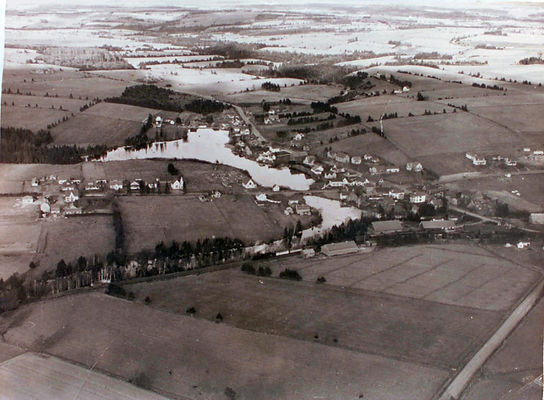Page Title
The Story of Fred Hunter

Where the village of Hunter River's name came from has long been debated by the residents. There are two different stories, one based more in fact and the other based on legend. In 1765, the name Hunter River appears in the land survey done by Samuel J. Holland, who was the Surveyor General for British North America. It was named after Thomas Orby Hunter who was stationed at Rotterdam in 1746 as deputy paymaster for the English and Dutch troops. He later became a Lord of the Admiralty in 1761. Despite this factual account, many believe that the village was named for Fred Hunter and the tragic story that surrounds his name.
In 1806, George Truman and his daughter Inez lived in a small cottage called Lone Point, not far from where the village of Hunter River is now located. During October 1806, Truman rescued a young man from the waters off the shore of the Island, who was clinging to the side of a ship that had been destroyed by a terrible storm. The man was from England and gave his name as Fred Hunter. Fred recovered quickly under the care of George and his daughter and ended up staying at with them Lone Point. Fred was two years older then Inez but they soon became friends and over time fell in love. By 1812 war had broken out between Britain and the United States. With this news Fred became torn between the love of his home country and the love of his life, Inez. With encouragement from Truman, Fred decided to enlist and temporarily leave his love behind. After being delayed in Halifax and Quebec, he was sent to the front in Niagra, where he was wounded in July of 1814. He was taken to hospital where he would make a slow but full recovery.
In the fall, while Fred was lying in the hospital recovering, they received word at Lone Point that Fred had been wounded and died. The news was devastating for Inez and her father, who spent the winter dealing with their grief and guilt. As spring arrived, so did a ship from England. On this ship was a man named Jack Seymour, who was the son of a gentleman from Bristol. Jack began spending a great deal of time with the Truman's at Lone Point and soon he was occupying the hole that Fred had left in Inez's heart. Jack returned to England that fall with promises to return in the spring and upon his return he and Inez decided to marry at Christmas, when a missionary father would return to the area.
While a wedding date was being set in Lone Point, the war was over and Fred Hunter had completely recovered from his wounds in hospital. Fred was sent to Quebec where he would board a ship bound for Halifax and begin his journey home to Inez. During the trip the ship was captured and Fred was sent to St. Pierre where he was held until the signing of peace. Fred was then able to continue his journey to Halifax where he was paid and discharged from service. He then made his way to Charlottetown where he left on foot headed for Lone Point.
When Fred reached the cottage he looked nothing like the man who had left there years prior. He was exhausted after the long trip home and wanted nothing more then to be in the arms of Inez. As he entered the cottage he was unable to see what was happening, but as his eyes adjusted to the light he realized that he had arrived in the middle of Inez and Jack taking their marriage vows. When Fred realized what was happening he turned and ran. Inez was unsure if she had just seen her long lost love or merely his ghost. The ceremony continued but the mood had changed from one of joy to one of sadness.
The following day a search was done of the area to see if Fred could be found, but there was no trace of the man. Later that winter a couple of lumbermen found the body of a man next to the stream now known as Hunter River, approximately six miles from Lone Point. The man's head rest on his bag, as though he had laid down to rest. The discharge papers within the bag identified the man as Fred Hunter. His remains were buried on the spot. Eventually Fred Hunter's remains were exhumed and re-interred in the Presbyterian Church Cemetery.